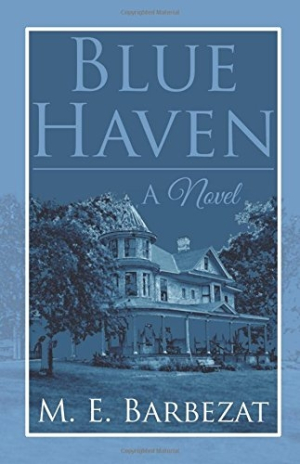Blue Haven
Blue Haven gives a familiar inheritance premise new life with supernatural elements and a pragmatic and steady lead.
A pragmatic woman finds her mettle tested by ambitious relatives and supernatural forces in M. E. Barbezat’s genre-bending thriller, Blue Haven.
Blue Haven opens with the reading of a will. Maggie expects nothing much—maybe a little money, perhaps a few pieces of china. Instead, she inherits her aunt’s sprawling estate—known as Blue Haven—and the mind-boggling wealth that accompanies it. The decision sits poorly with some of Maggie’s cousins, who promptly conspire to steal her inheritance. In an unexpected twist, supernatural forces also appear on her doorstep.
Maggie Ashland is a refreshing protagonist. At first glance, she lacks the necessary skills to cope with her scheming cousins and a manipulative supernatural persona. But she works as a music teacher, an occupation that highlights her resourcefulness. Her ability to adapt to shifting circumstances, whether the root cause be supernatural or human-based, keeps the narrative from becoming too dark. The respect that Maggie retains for her aunt also provides an effective foil for the rest of her ill-mannered extended family.
Maggie’s relationships with her immediate family are a welcome element. While her contentious interactions with her ex-husband and greedy cousins veer toward the predictable, the support and respect that she receives from her adult children is surprising within the genre. Maggie also keeps a level head despite the sudden influx of money, neatly skipping over morality lessons about the transient nature of material goods.
The evolution of Maggie’s friendship with Muriel, her aunt’s lawyer, also follows a pleasant trajectory. Though their initial impressions of each other are less than favorable, they pivot to a delightful alliance, forming a solid front and easily countering attempts at sabotage. Maggie’s allies in the text are well-rounded, though characters who work against her exist more as caricatures whose actions only cement their evil.
Supernatural elements are novel but ineffectively incorporated. Choppy transitions between Maggie’s mundane dealings with belligerent humans and her less confident exchanges with paranormal creatures prove jarring. Although the ways that such supernatural interactions transform Maggie are explained, the resolutions are not wholly satisfactory.
Prose is simple and clear and serves the narrative well; it never distracts from the action. Dialogue, however, is more distracting; a few characters share significant exchanges exclusively in French. Such passages are followed by English translations, but they still bog the pace.
Blue Haven gives a familiar inheritance premise new life with supernatural elements and a down-to-earth, steady lead. With Maggie and her children gaining new powers near the end, a sequel seems implied, but this is a story that can stand on its own.
Reviewed by
Vernieda Vergara
Disclosure: This article is not an endorsement, but a review. The publisher of this book provided free copies of the book and paid a small fee to have their book reviewed by a professional reviewer. Foreword Reviews and Clarion Reviews make no guarantee that the publisher will receive a positive review. Foreword Magazine, Inc. is disclosing this in accordance with the Federal Trade Commission’s 16 CFR, Part 255.

